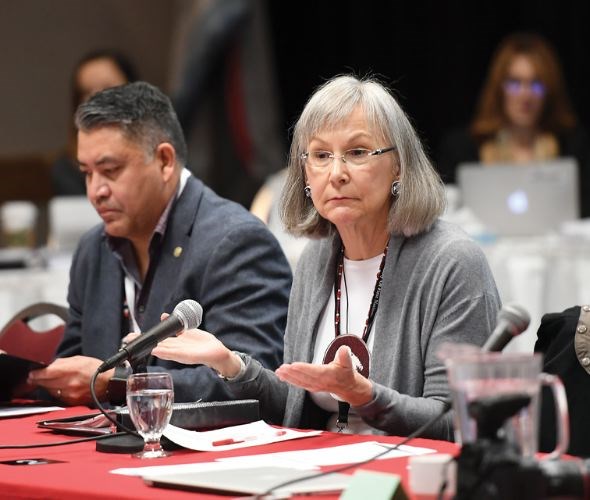Marion Buller, chief commissioner of the National Inquiry into Missing and Murdered Indigenous Women and Girls, made her case for a two-year extension to a meeting of indigenous leaders on Friday in Prince George.
Buller spoke before a meeting of the B.C. Assembly of First Nations at the Ramada. In her remarks, Buller defended the request made by the inquiry to the federal government for a two-year extension of its mandate. The inquiry made its request public on Tuesday.
According to a report in the Toronto Star, the extension would come with an additional $50 million price tag for the federal government. The $54 million inquiry was initially supposed to wrap up by the end of this year.
Buller argued that the initial timeframe of the 28-month inquiry was hampered by delays at the outset. Federal government bidding processes hampered the hiring of staff, as well as the establishment of IT systems necessary to coordinate the work of gathering testimony from hundreds of families of missing and murdered women across Canada.
Buller also said the extra two years are required for the inquiry to delve into how family members of murdered and missing indigenous women and girls feel that they have been mistreated by the police and criminal justice system.
The two-year extension would mean the inquiry would not be completed until 2020, a year after the next federal election. The inquiry has so far heard testimony from 763 witnesses and has collected an additional 276 statements.
Buller faced pointed questions from several First Nations leaders during Friday's meeting.
Chief Judy Wilson of the Neskonlith-Tsilhqot’in Nation asked a number of questions of Buller. Many of her questions focused upon the impact a refusal for the extension of the mandate would have upon planned expert hearings on institutional and systemic treatment of First Nations people.
"If institutional expert hearings are not held, how will organizations with standing for those parts contribute? Because we mentioned a lot of our organizations have had trouble getting standing. So what does it mean if we have that?" Wilson asked.
"Without an extension, we're looking at three panels on human rights, one on racism and one on policing in a general sense and the justice system," Buller said in response.
"We're working as we speak to classify those hearings so all parties that stand in part two and part three will be able to participate."
Chief Wilf Adam of the Lake Babine Nation asked what impact the public resignations have had on the inquiry.
The inquiry has faced a series of resignations of staff and leaders.
Buller said she could not comment on the specifics of personnel who have left. However, she responded that the inquiry was hampered from the beginning by federal restrictions. The initial opening of the commission's office in Vancouver was beset by delays.
"We worked out of our homes, we had to use our own cellphones, to get this up and running. It took time to open our office in Vancouver, which is our head office,” Buller said.
In an interview with the Citizen, Buller said the delays cut into the tight timeframe of the inquiry.
“We weren't on the ground holding hearings until eight and a half months after our start date," Buller said.
She also said an extension of the mandate would allow the inquiry to delve deeper into issues of systemic treatment of indigenous people in the criminal justice system.
"When you start looking at policing as a heading, then you get into things like training, supervision, policy, follow-up, the impact of transfers on small communities and what initiatives have increasingly worked well."
"Once you start hearing issues from individuals, you see the depth that is required," Buller said.
Indigenous people in British Columbia face rates of incarceration far higher than non-Indigenous people.
Buller said the Truth and Reconciliation Commission, which took seven years, was allowed to extend its mandate by the federal government.
"It's like doing a renovation of your house. You think you know what you have to do and how much it's going to cost. But you really don't know what you have to do until you start ripping the walls down," she said.


